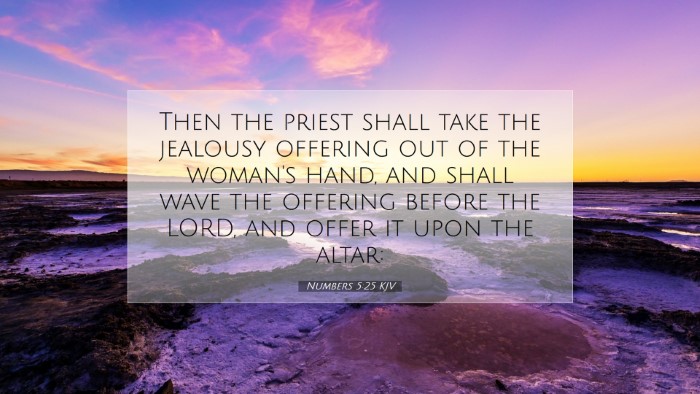Commentary on Numbers 5:25
Numbers 5:25 states, "Then the priest shall take the woman’s hand and put the offering for the priest into her hand, the offering of jealousy; and the priest shall have in his hand the bitter water that brings a curse." This verse is situated within a specific context that addresses the laws concerning jealousy and suspected infidelity among the Israelites. The passage demonstrates the ancient ritual prescribed for a woman suspected of unfaithfulness.
Contextual Background
This ritual, known as the "Sotah" process, embodies themes of fidelity, divine justice, and the communal aspects of faith. As Matthew Henry elucidates, it emphasizes God's governance over the social fabric of Israel, maintaining both personal and communal integrity.
Insights from Commentators
-
Matthew Henry:
Henry posits that this circumstance reflects the seriousness with which God regards marital fidelity. The ritual serves as a divinely sanctioned method for handling suspicion, safeguarding the sanctity of marriage while also protecting the innocent. The “bitter water” symbolizes not only the gravity of the accusation but also the Judicial nature of God's presence among His people.
Furthermore, he sees the offering of jealousy as a poignant expression of the wife’s vulnerability, symbolizing her desperate need for vindication and the preservation of her honor.
-
Albert Barnes:
Barnes provides a historical interpretation of this verse, highlighting that the ritual was intended to prevent wrongful accusation while allowing God to reveal truth. He notes that the priest plays a pivotal role in mediating, reflecting God’s initiative to discern truth amidst human frailty. The ceremonial aspects also reinforce communal respect, as public accusations could lead to widespread gossip and unrest.
In his view, the "bitter water" epitomizes the severe consequences of sin and false accusations, suggesting that the act of drinking it is both an affirmation of faith and a test of integrity before God.
-
Adam Clarke:
Clarke’s interpretation dwells on the theological implications of this text. He emphasizes that God, through the priestly ministry, provides a means for directly engaging with human sin and jealousy. The ritual functions to eliminate suspicion while affirmatively placing the accused woman in a position to clear her name. Clarke suggests that this foreshadows a greater revelation of God’s justice and mercy, evident in Christ's eventual unfolding of grace.
Clarke further asserts that this process illustrates the need for a transparent approach to accusations in communities, reinforcing the importance of truth-telling and integrity in interpersonal relationships.
Theological Significance
Theologically, Numbers 5:25 and its surrounding verses introduce profound reflections on faith, accountability, and divine oversight. The priest's role as mediator signifies the ongoing theme of intercession throughout Scripture, reminding believers of God's involvement in human affairs. God desires truth and fidelity, not only in marriages but in all relationships.
Implications for Pastoral Ministry
For pastors and leaders, this passage serves as an important reminder to foster environments of trust and open communication. When addressing issues of relational conflict or suspicions, it is crucial to seek God's guidance through prayer and Scripture, parallel to the ritual observed in the text.
The use of rituals, such as those described, provides insight into the broader application of communal practices in maintaining integrity and accountability within congregations.
Lessons for Theology Students and Scholars
The richness of this passage invites deeper exploration of how divine justice operates within community life. Theology students should examine the implications of God’s law in a contemporary context, analyzing how rituals can inform modern practices of accountability and reconciliation.
Scholars may explore parallels within the New Testament, particularly how the issues of mistrust and the need for restoration are addressed in Christ’s teachings. The transformative aspects of grace versus law provide critical areas for academic inquiry.
Conclusion
In summary, Numbers 5:25 encapsulates a unique blend of legal, spiritual, and ethical dimensions significant for understanding God’s covenant community. The ritual prescribed offers insights into human relationships and provides a framework for handling accusations and suspicions with sensitivity and respect for divine order.
The combined insights by Matthew Henry, Albert Barnes, and Adam Clarke encourage readers to not only reflect on the text itself but to apply its principles in nurturing communities that reflect God's justice and mercy.


